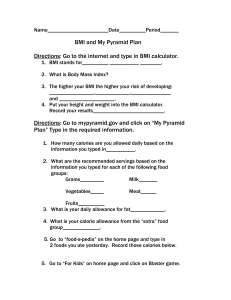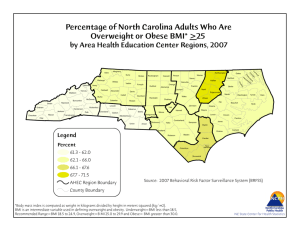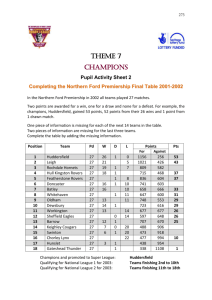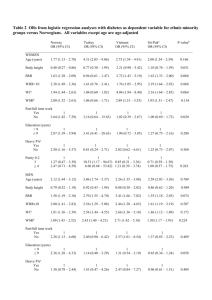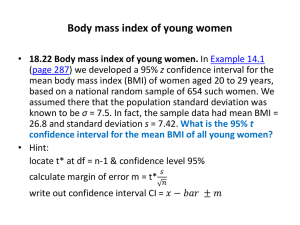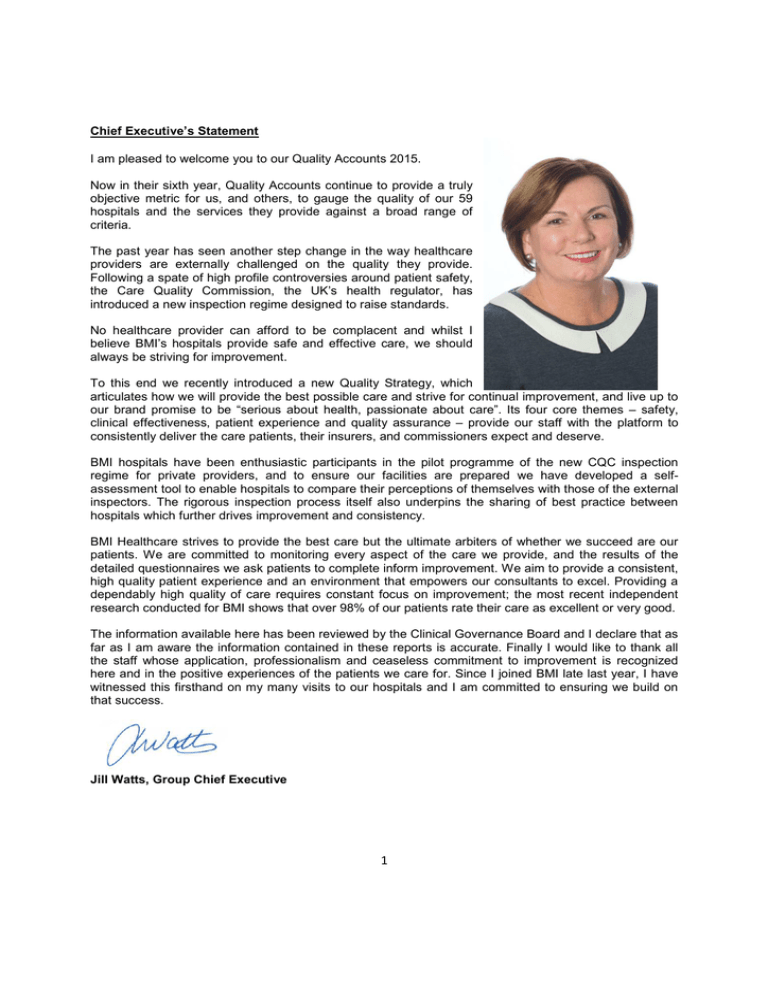
Chief Executive’s Statement
I am pleased to welcome you to our Quality Accounts 2015.
Now in their sixth year, Quality Accounts continue to provide a truly
objective metric for us, and others, to gauge the quality of our 59
hospitals and the services they provide against a broad range of
criteria.
The past year has seen another step change in the way healthcare
providers are externally challenged on the quality they provide.
Following a spate of high profile controversies around patient safety,
the Care Quality Commission, the UK’s health regulator, has
introduced a new inspection regime designed to raise standards.
No healthcare provider can afford to be complacent and whilst I
believe BMI’s hospitals provide safe and effective care, we should
always be striving for improvement.
To this end we recently introduced a new Quality Strategy, which
articulates how we will provide the best possible care and strive for continual improvement, and live up to
our brand promise to be “serious about health, passionate about care”. Its four core themes – safety,
clinical effectiveness, patient experience and quality assurance – provide our staff with the platform to
consistently deliver the care patients, their insurers, and commissioners expect and deserve.
BMI hospitals have been enthusiastic participants in the pilot programme of the new CQC inspection
regime for private providers, and to ensure our facilities are prepared we have developed a selfassessment tool to enable hospitals to compare their perceptions of themselves with those of the external
inspectors. The rigorous inspection process itself also underpins the sharing of best practice between
hospitals which further drives improvement and consistency.
BMI Healthcare strives to provide the best care but the ultimate arbiters of whether we succeed are our
patients. We are committed to monitoring every aspect of the care we provide, and the results of the
detailed questionnaires we ask patients to complete inform improvement. We aim to provide a consistent,
high quality patient experience and an environment that empowers our consultants to excel. Providing a
dependably high quality of care requires constant focus on improvement; the most recent independent
research conducted for BMI shows that over 98% of our patients rate their care as excellent or very good.
The information available here has been reviewed by the Clinical Governance Board and I declare that as
far as I am aware the information contained in these reports is accurate. Finally I would like to thank all
the staff whose application, professionalism and ceaseless commitment to improvement is recognized
here and in the positive experiences of the patients we care for. Since I joined BMI late last year, I have
witnessed this firsthand on my many visits to our hospitals and I am committed to ensuring we build on
that success.
Jill Watts, Group Chief Executive
1
Hospital Information
BMI The Huddersfield Hospital has 29 beds with all rooms offering the privacy and comfort of
en-suite facilities, TV and telephone. The hospital has 2 theatres. These facilities combined with
the latest in technology and on-site support services; enable our consultants to undertake a
wide range of procedures from routine investigations to complex surgery. This specialist
expertise is supported by caring and professional medical staff, with dedicated nursing teams
and Resident Medical Officers on duty 24 hours a day, providing care within a friendly and
comfortable environment.
The hospital sees a mixture of NHS and Private Patients on an outpatient, inpatient and day
case basis. Patients can access a wide range of services at BMI Huddersfield Hospital through
the NHS choose and book scheme ,in addition to the Choose and Book scheme, the hospital
has performed spot purchase work from the local trusts in the area.
Year 2014-2015 the hospital treated 3247 patients 75.8% of these patients being NHS patients
and 24.2% private patients.
In 2014 -15 work has been completed to repair windows that will provide improved insulation,,
and added security on the ground floor. The main stair case in the hospital has recently been
refurbished. There is an ongoing commitment to ensure that theatre equipment is being
replaced when required to ensure that Consultants have the most up to date and reliable
equipment available to them.
2
A new ultrasound room has been created and decorated to complement the ultrasound machine
which was purchased in 2013-14 in the imaging department.
BMI Huddersfield Hospital offers the following specialties and services:
Acupuncture
Imaging
Allergy testing
- Mammography
Anaesthetics
- MRI scanning
- Ultrasound
Cardiology
- X-ray
Chest medicine
Colorectal surgery
Neurology
Colposcopy
Ophthalmology
Cosmetic surgery
Optometry
Dermatology
Oral/maxillofacial surgery
Endocrinology
Orthopedic surgery
Endoscopy
Physiotherapy
ENT surgery
Plastic and reconstructive surgery
Erectile dysfunction
Pre-admission clinic
Family Planning
Psychiatry
Gastroenterology
Radiology
General medicine
Respiratory medicine
General surgery
Rheumatology
Geriatric medicine
Sports injury clinic
Gynecology
Urology
Vascular surgery
3
BMI Healthcare are registered as a provider with the Care Quality Commission (CQC) under the
Health & Social Care Act 2008. BMI Huddersfield is registered as a location for the following
regulated services:•
•
•
Treatment of disease, disorder and injury
Surgical procedures
Diagnostic and screening
The CQC carried out an unannounced inspection on 10/12/13 and found compliance with the
following standards:
Huddersfield Hospital has a local framework through which clinical effectiveness, clinical
incidents and clinical quality is monitored and analysed. Where appropriate, action is taken to
continuously improve the quality of care. This is through the work of a multidisciplinary group
and the Medical Advisory Committee.
Regional Clinical Quality Assurance Groups monitor and analyze trends and ensure that the
quality improvements are operationalised. There has been development of
At corporate level the Clinical Governance Board has an overview and provides the strategic
leadership for corporate learning and quality improvement.
There has been ongoing focus on robust reporting of all incidents, near misses and outcomes.
Data quality has been improved by ongoing training and database improvements. New reporting
modules have increased the speed at which reports are available and the range of fields for
analysis. This ensures the availability of information for effective clinical governance with
implementation of appropriate actions to prevent recurrences in order to improve quality and
safety for patients, visitors and staff.
4
At present we provide full, standardised information to the NHS, including coding of procedures,
diagnoses and co-morbidities and PROMs for NHS patients.There are additional external
reporting requirements for CQC, Public Health England (Previously HPA) CCGs and Insurers
BMI is a founding member of the Private Healthcare Information Network (PHIN) UK – where
we produce a data set of all patient episodes approaching HES-equivalency and submit this to
PHIN for publication. The data is made available to common standards for inclusion in
comparative metrics, and is published on the PHIN website http://www.phin.org.uk. This website
gives patients information to help them choose or find out more about an independent hospital
including the ability to search by location and procedure.
1. Safety
1.1 Infection prevention and control
The focus on infection prevention and control continues under
the leadership of the Group Head of Infection Prevention and
Control, in liaison with the link nurse in Huddersfield
The focus on infection prevention and control continues under
the leadership of the Group Director of Infection Prevention and
Control and Group Head of Infection Prevention and Control, in
liaison with the Infection Prevention and Control Lead
Huddersfield.
We have had: • Zero MRSA bacteraemia cases/100,000 bed days
• Zero MSSA bacteraemia cases /100,000 bed days
• Zero E.coli bacteraemia cases/ 100,000 bed days
• Zero of hospital apportioned Clostridium difficile in the last 12 months.
• SSI data is also collected and submitted to Public Health England for Orthopaedic
surgical procedures. Our rates of infection are;
o Zero Hips
o Zero Knees
5
As per DH recommendations BMI Huddersfield Hospital has appointed a Director of Infection
Prevention and Control (DIPC) at each Hospital site, who is supported by a Consultant
Microbiologist, Infection Prevention Nurse (IPN) and link workers. The site Infection Prevention
team meets quarterly to discuss all matters relating to IPC including water safety,
decontamination, infection issues and Root Cause Analyses (RCA) and surveillance, and full
Committee meetings being held three times per year.
Full environmental audits have been undertaken in the last year on the ward, theatre and in the
Consulting Rooms. Action plans were completed which have been followed up by the
respective link practitioners and Heads of Department, and IPN. Audit results and action plans
are discussed at both hospital and Committee meetings.
The hospital has completed its PLACE audit.
Hand hygiene audits are scheduled to take place in all clinical departments on a monthly basis.
IPC is included in the mandatory training requirements for all clinical and non-clinical staff and
incorporates e-learning, face-to-face interactive presentations and practical assessments.
The hospital team has implemented the peripheral cannula, surgical site infection (SSI) and
indwelling catheter care bundles and a high level of consistent practice was demonstrated in the
audit results.
Environmental cleanliness is also an important factor in infection prevention and our patients
rate the cleanliness of our facilities highly.
6
1.2 Patient Led Assessment of the Care Environment (PLACE)
We believe a patient should be cared for with compassion and dignity in a clean, safe environment.
Where standards fall short, they should be able to draw it to the attention of managers and hold the
service to account. PLACE assessments will provide motivation for improvement by providing a clear
message, directly from patients, about how the environment or services might be enhanced.
In 2013 we introduced PLACE, which is the new system for assessing the quality of the patient
environment, replacing the old Patient Environment Action Team (PEAT) inspections.
The assessments involve patients and staff who assess the hospital and how the environment
supports patient’s privacy and dignity, food, cleanliness and general building maintenance. It focuses
entirely on the care environment and does not cover clinical care provision or how well staff are
doing their job.
The results will show how hospitals are performing nationally and locally. The below shows the
results of the 2014 and 2015 audits and improvement in all areas.
7
.1.3 Venous Thrombo-embolism (VTE)
BMI Healthcare, holds VTE Exemplar Centre status by the Department of Health across its
whole network of hospitals including, Huddersfield BMI Healthcare was awarded the Best VTE
Education Initiative Award category by Lifeblood in February 2013 and were the Runners up in
the Best VTE Patient Information category.
We see this as an important initiative to further assure patient safety and care. We audit our
compliance with our requirement to VTE risk assessment every patient who is admitted to our
facility and the results of our audit on this has shown
BMI The Huddersfield hospital has had a 0% incidence of VTE in this reporting year.
Huddersfield Hospital reports the incidence of Venous Thromboembolism (VTE) through the
corporate clinical incident system. It is acknowledged that the challenge is receiving information
for patients who may return to their GPs or other hospitals for diagnosis and/or treatment of VTE
post discharge from the Hospital. As such we may not be made aware of them. We continue to
work with our Consultants and referrers in order to ensure that we have as much data as
possible. .
8
The hospital now has a dedicated VTE link nurse who is working closely with consultants to
ensure that hospital policies and procedures are in line with current best practice guidelines and
a clear process is followed to ensure all patients are appropriately risk assessed prior to theatre.
2. Effectiveness
2.1 Patient reported Outcomes (PROMS)
Patient Reported Outcome Measures (PROMs) are a means of collecting information on the
effectiveness of care delivered to NHS patients as perceived by the patients themselves.
PROMs is a Department of Health led program.
Latest results can be found by going on the online SOLAR system provided to you by Quality
Health
For the current reporting period, the tables below demonstrate that the health gain between
Questionnaire 1 (pre-operative) and Questionnaire 2 (post–operative) for patients undergoing
hip replacement and knee replacement at BMI The Huddersfield Hospital. The results for both
hip and knee PROMS are higher than the national average and for knees the results are
significantly higher. The consistently high results are a result of excellent patient experience and
our team approach to care from the initial consultant appointment to consultant delivered
surgery through to physiotherapist led discharge.
April 14 – September 14
BMI Huddersfield
England
Oxford Hip Score average
Health gain between reporting
Q1
Q2
periods
No data No data
18.16
40.081
21.922
Copyright © 2013, The Health and Social Care Information Centre. All Rights Reserved.
April 14 – September 14
BMI Huddersfield
England
Oxford Hip Score average
Health gain between reporting
Q1
Q2
periods
15.7
23.3
39
18.16
40.081
21.922
Copyright © 2013, The Health and Social Care Information Centre. All Rights Reserved.
9
2.2 Enhanced Recovery Programme (ERP)
The ERP is about improving patient outcomes and speeding up a patient’s recovery after
surgery. ERP focuses on making sure patients are active participants in their own recovery and
always receive evidence based care at the right time. It is often referred to as rapid recovery, is
a new, evidence-based model of care that creates fitter patients who recover faster from major
surgery. It is the modern way for treating patients where day surgery is not appropriate.
ERP is based on the following principles:1. All Patients are on a pathway of care
a. Following best practice models of evidenced based care
b. Reduced length of stay
2. Patient Preparation
a. Pre Admission assessment undertaken
b. Group Education sessions
c. Optimizing the patient prior to admission – i.e HB optimisation, control comorbidities, medication assessment – stopping medication plan.
d. Commencement of discharge planning
3. Proactive patient management
a. Maintaining good pre-operative hydration
b. Minimising the risk of post-operative nausea and vomiting
c. Maintaining normothermia pre and post operatively
d. Early mobilisation
4. Encouraging patients have an active role in their recovery
a. Participate in the decision making process prior to surgery
b. Education of patient and family
c. Setting own goals daily
d. Participate in their discharge planning
BMI Huddersfield Hospital has a multidisciplinary team of professionals who deliver a successful
ERP pathway of care to patients. There is a dedicated Pre Assessment team who manage
patient expectation regarding length of stay and commence the discharge process before
patients are admitted, ensuring all their home care needs are met and any intervention required
post discharge is pre- planned. We have a team of physiotherapists who work closely with the
Consultants to promote early and continued mobilization of patients post operatively. Our
current statistics show our average length of stay, year to date for knee replacements is 2.33
days
10
2.3 Unplanned Readmissions within 31 days and unplanned returns to theatre.
Unplanned readmissions and unplanned returns to theatre are normally due to a clinical
complication related to the original surgery.
11
There were 4 unplanned readmissions to The BMI Huddersfield. All such incidents are
investigated and reported through the hospital’s governance structure and reviewed at the
Governance Committee
There was two unplanned return to theatre.
At BMI Huddersfield there have been very few returns to theatre or re admissions within 31 days
and the data shows a reduction in both cases over the last 12 months.
3. Patient experience
3.1 Patient satisfaction
BMI Healthcare is committed to providing the highest levels of quality of care to all of our
patients. We continually monitor how we are performing by asking patients to complete a patient
satisfaction questionnaire. Patient satisfaction surveys are administered by an independent third
party.
The following 4 tables are examples of just some of the key questions within the survey and
The BMI Huddersfield performance over a rolling 12 month period. The hospital discusses the
12
reports at the Operational Team and Hospital Governance meetings. Specific actions that might
be required are agreed at either forum.
13
100% of the inpatients would recommend the the hospital and this has remained fairly stable
throught the year 2014-2015
When considering both very good and excellent, the overall impression of nursing care has
remained consistently around and above 80%.
The ward has now a new ward manager and part of the managers objectives are to increase a
higher standartd of nursing by looking at new ways of working
3.2 Complaints
In addition to providing all patients with an opportunity to complete a satisfaction survey BMI
Huddersfield actively encourages feedback both informally and formally. Patients are supported
through a robust complaints procedure, operated over three stages:
Stage 1: Hospital resolution
Stage 2: Corporate resolution
Stage 3: Patients can refer their complaint to independent adjudication if they are not satisfied
with the outcome at the other 2 stages.
There is a very clearly defined complaints procedure which ensures complaints are dealt with
promptly and professionally. The hospital Executive Director personally responds to every
customer who has a complaint.
The hospital has a structured lessons learned process whereby the outcomes of complaints are
communicated to staff to ensure correct policy and procedures are being followed at all times.
14
The data above shows that BMI Huddersfield Hospital experienced a decrease in last year but
an increase in the number of written complaints. Although the data demonstrates that
significantly less than one percent of admitted patients complain we do take all complaints
seriously and treat each as an individual learning opportunity,the majority of complaints can be
categorised into two trends. One administrative errors and the other nursing care. Our
administration team is now fully recruited and new process have been put in place, a robust
training induction and training package has also been undertaken to ensure consistent
adherence to the administrative processes. A new ward manager is now in post, part of their
objectives is to look at training and development needs for her nursing team and also how to
improve on patient needs and care.
4. CQUINS
5.
The key aim of the Commissioning for Quality and Innovation (CQUIN) framework for
2013/14 was to secure improvements in quality of services and better outcomes for
patients. These remain the same for 2014/15
BMI Huddersfield Hospital work closely with the local Care Commissioning Group(CCG) to
agree local targets that reflect the local patient demographic. Regular meetings are held with the
CCG to monitor progress of agreed targets. This year’s local CQUIN measures included
implementation of 48 hour post discharge call for day case patients and brief intervention for
those patients identified as drinking more than the recommended weekly consumption of
alcohol.
The tables below give a summary of the CQUIN data for BMI Huddersfield Hospital during
2014/15. The first table gives a summary of the goals for the 2013/14 CQUINS followed by the
results the hospital achieved.
15
Goal Name
Friends and Family Test
NHS Safety Thermometer
Description of Goal
To improve the experience in line with
Domain 4 of the NHS Outcomes
Framework
Improve the collection of data in realtion
to pressure ulcers, falls, urinary tract
infections in those with a catheter and VTE
Venous Thromboembolism To reduce avoidable death, disability and
chronic health from venous
thromboembolism (VTE)
Contact with Day Case pts To improve the outcomes for patients
undergoing day-case surgery through
contacting them 48 hours post surgery
Well being - alcohol
To ensure that patients are given brief
advice around alcohol consumption and/or
sign-posted/referred to appropriate
services
6. National Clinical Audits
BMI Huddersfield Hospital was only eligible to participate in National Joint Registry audit and all
joint replacements are submitted to this. The hospital shows good compliance with data input
into the register with 100% of eligible patients giving consent for their data to be used in the
register and 100% link-ability to the patients NHS number.
Looking forward to the next 12 months the BMI Huddersfield Hospital will continually strive to to
achieve 100% on the above areas together with further key aims to ensure continued
compliance with data input into the National joint Registry;
•
To provide high quality and relevant data in line with the National Joint Registry’s
mission statement
16
•
To set up Key Performance Indicators in line with the key quality indicators of
Compliance, Consent and Link-ability.
•
To respond to National Joint Registry’s requested information within the agreed
timescales.
•
To improve performance in the key quality indicators in line with National averages
7. Research
No NHS patients were recruited to take part in research.
8. Priorities for service development and improvement
•
•
Following an initial review of the priorities for service development, over the
last 12 months the BMI Huddersfield Hospital now has ongoing improvement,
development and engagement with the Clinical Governance process and
reporting tools at hospital and corporate level, capital investment has been
made in equipment and instrument replacement, environmental and safety
improvements have been made in clinical areas.
These include: Operating Theatre improvements, patient bedroom
upgrade/refurbishment, and Main staircase refurbishment.
•
A review is being carried out by the theatre manager and out patient’s
manager of ambulatory care within the hospital and how this can be
improved. This will require a review of environmental factors as well as the
patient pathway.
•
A Minor Procedure Room in the hospital’s Consulting Rooms is being
planned this offers a more comfortable and less stressful experience for
patients in comparison to a full Operating Department pathway.
•
A development of a new spread sheet looking at the patients journey from
their first visit to out patients to their discharge from the hospital, helping all
who are involved in planning patient care.
Continuing improvements to the way in which Safety, Health and the
Environment (SHE) issues are reported through the implementation of sub
groups and a wider understanding and implementation of audit.
•
•
Intentional ward rounds will be carried out on the wards offering an
improvement in patient care and better communication between patients and
staff
17
•
9. Mandatory Quality Indicators
8.1 The value of the summary hospital-level mortality indicator (SHMI) for the (Huddersfield) for
the reporting period.
Unit
0%
Reporting Periods
(at least last two
reporting periods)
Oct 2012 – Jun 2014
National
Average
Highest National
Score
Lowest National
Score
0.9987
1.1849
0.58345
8.2 The BMI Huddersfield patient reported outcome measures scores for
(i) Groin hernia surgery
Unit
0.127
Reporting Periods
(at least last two
reporting periods)
Apr 14 – Sept 14
National
Average
Highest National
Score
Lowest National
Score
0.0786
0.278
-0.112
The BMI Huddersfield considers that this data is as described for the following reasons
The BMI Huddersfield score is above the national average.
18
(ii) Varicose vein surgery
Unit
No BMI
Data
Reporting Periods
(at least last two
reporting periods)
Apr 14 – Sept 14
National
Average
Highest National
Score
Lowest National
Score
-7.395
-1.957
-12.571
There are no scores available for BMI Healthcare and therefore the BMI Huddersfield cannot be
scored
(iii) Hip replacement surgery
Unit
No Data
Reporting Periods
(at least last two
reporting periods)
Apr 14 – Sept 14
National
Average
Highest National
Score
Lowest National
Score
21.542
28.6
9.714
The BMI Huddersfield considers that this data is as described as less than 30 patients went
through the process and therefore cannot be scored.
(iv) Knee replacement surgery during the reporting period.
Unit
23.3
Reporting Periods
(at least last two
reporting periods)
Apr 14 – Sept 14
National
Average
Highest National
Score
Lowest National
Score
16.641
24.429
5.833
The BMI Huddersfield considers that this data is as described for the following reasons
With an above national average score the enhanced recovery program at the hospital is
contributing to good patient outcomes, this program will continue to be developed further.
8.3 (i) The percentage of patients aged 0-14 readmitted to a hospital which forms part of the
BMI Huddersfield within 28 days of being discharged from a hospital which forms part of the
hospital during the reporting period.
Unit
0%
Reporting Periods
(at least last two
reporting periods)
Apr 11 - Mar 12
National
Average
Highest National
Score
Lowest National
Score
11.45
14.35
7.96
The BMI Huddersfield considers that this data is as described for the following reasons.
The BMI Huddersfield does not admit or treat any patients in this age group.
19
8.3.(ii)The percentage of patients aged 15 or over readmitted to a hospital which forms part of
the BMI Huddersfield within 28 days of being discharged from a hospital which forms part of the
hospital during the reporting period.
Unit
0.25%
Reporting Periods
(at least last two
reporting periods)
Apr 11 – Mar 12
National
Average
Highest National
Score
Lowest National
Score
10.01
14.51
5.54
The BMI Huddersfield considers that this data is as described for the following reasons.
Good pre assessment screening and post anaesthetic care results in a low readmission rate.
8.4 The BMI Huddersfield responsiveness to the personal needs of its patients during the
reporting period.
Unit
97.2%
Reporting Periods
(at least last two
reporting periods)
2013-2014
National
Average
Highest National
Score
Lowest National
Score
68.7
85
54.4
The BMI H considers that this data is as described for the following reasons this t reflects the
overall satisfaction of our patients.
A focus on providing a high standard of customer care to all our patients results in high levels of
patient satisfaction.
8.5 The percentage of patients who were admitted to The BMI Huddersfield and who were risk
assessed for venous thromboembolism during the reporting period.
Unit
100%
Reporting Periods
(at least last two
reporting periods)
Apr 14 – Jan 15
National
Average
Highest National
Score
Lowest National
Score
95
100
87
The BMI Huddersfield considers that this data is as described for the following reasons
A dedicated team of skilled nurses are receive regular training on the prevention of VTE
following surgery and monthly audits are carried out to ensure continued compliance
20
8.6 The rate per 100,000 bed days of cases of C difficile infection reported within the BMI
Huddersfield amongst patients aged 2 or over during the reporting period.
Unit
0
Reporting Periods
(at least last two
reporting periods)
Apr 13 – Mar 14
National
Average
Highest National
Score
Lowest National
Score
14.7
37.1
0
The BMI Huddersfield considers that this data is as described for the following reasons
There is a dedicated infection control nurse who delivers regular training throughout the
hospital. The Patient bedrooms and bathrooms are single patients use and hand washing
facilities are readily available with education on hand washing techniques displayed throughout
the hospital.
8.7 The number and, where available, rate of patient safety incidents reported within the BMI
Huddersfield during the reporting period, and the number and percentage of such patient safety
incidents that resulted in severe harm or death.
Number of patient safety incidents reported
Unit
45
Reporting Periods
(at least last two
reporting periods)
Oct 13 – Sep 14
National
Average
Highest National
Score
Lowest National
Score
20
139
0
Rate of patient safety incidents reported (Incidents per 100 Bed Days)
Unit
3.2636
Reporting Periods
(at least last two
reporting periods)
Oct 13 – Sep 14
National
Average
Highest National
Score
Lowest National
Score
3.589
7.496
0.0245
Number of patient safety incidents that resulted in severe harm or death
Unit
0
Reporting Periods
(at least last two
reporting periods)
Oct 13 – Sept 14
National
Average
Highest National
Score
Lowest National
Score
40.2
97
0
Percentage of patient safety incidents that resulted in severe harm or death (Incidents per 100
Admissions)
21
Unit
0%
Reporting Periods
(at least last two
reporting periods)
Oct 13 – Sept 14
National
Average
Highest National
Score
Lowest National
Score
0.3
2.4
0.0
The BMI Huddersfield that this data is as described for the following reasons.
There is a robust process for the reporting and investigating of incidents. This includes the
reporting of cancellations of surgery and day cases who stay overnight as clinical incidents.
There have been no serious untoward incidents or never events.
8.8 The percentage of staff employed by the BMI Huddersfield during the reporting period, who
would recommend the BMI Huddersfield as a provider of care to their family or friends.
Unit
68%
Reporting Periods
(at least last two
reporting periods)
2014
National
Average
Highest National
Score
Lowest National
Score
64.58
96.43
33.73
The BMI Huddersfield considers that this data is as described for the following reasons
The above data and below notes are taken from 2013 audit as no staff survey has taken place
for 2014-2015
Although we are scoring above the national average BMI Huddersfield Hospital will be
improving communications with our staff in a variety of ways including staff forums,
departmental meetings and information sharing via email to ensure they are engaged with
developments in the hospital.
10.
Non-Mandatory Quality Indicators
9.1 The percentage of patients who received care as inpatients or discharged from A &E during
the reporting period, who would recommend the BMI Huddersfield as a provider of care to their
family or friends.
Unit
78%
Reporting Periods
(at least last two
reporting periods)
Jun 13 – Jan 14
National
Average
Highest National
Score
Lowest National
Score
66.23
94.38
35.63
The BMI Huddersfield considers that this data is as described for the following reasons
Although we are scoring above the National average the BMI Huddersfield Hospital will continue
to seek feedback from our patients in a variety of ways to ensure we are listening to concerns
22
and actions are taken if there are specific areas within the hospital that have a downward trend
in patient satisfaction.
The BMI Huddersfield hospital continually endeavor’s to retain and improve its score.
23

